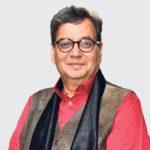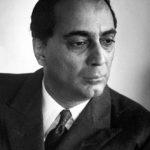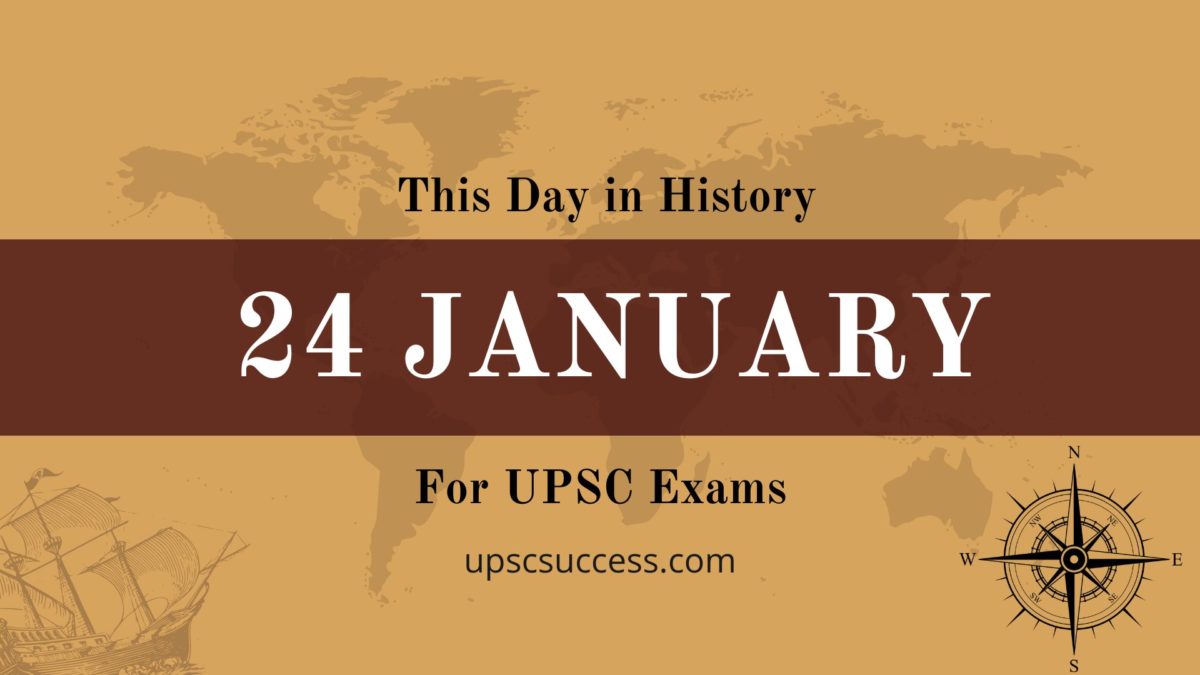Contents
This Day in History on 24 January
The historical events hold a lot of value for aspirants who are sitting for UPSC competitive exams including the IAS Exam.
On this page, we will list all historical events that occurred on 24 January. The students can refer to them while preparing for all competitive exams and banking exams.
Important Days
Uttar Pradesh Day (Uttar Pradesh, India): Uttar Pradesh Day is a public holiday in the Indian state of Uttar Pradesh, which is celebrated on January 24. It marks the day that Uttar Pradesh was formed as a state in 1950, after the independence of India from British rule. On this day, various cultural programs and events are held to celebrate the state’s rich history and cultural heritage. There are also parades, competitions, and sports events held to mark the occasion.
Important Events
1839: Charles Darwin was elected a Fellow of the Royal Society.
1848: California Goldrush – A man named James Marshall found a large quantity of gold in a stream at Stutters Mill, California.
1857: The first South Asian University had established in Kolkata.
1862: Bucharest became the capital of Romania.
1916: Income tax invalidated by US Supreme Court for invading civil liberties.
1937: Gandhi announces that he will retire from politics.
1939: 30 thousand people died due to an earthquake in Chile.
1942: In World War II, the Allies bombed Bangkok. It forced Thailand to wage war against England and the United States.
1950: Jan Gana Mana got the status of the national anthem of India.
1950: Dr. Rajendra Prasad became the first President of India.
1951: Nehru assails US. demand for UN to name Peking as aggressor in Korea, New Delhi.
1952: The first International Film Festival had held in Bombay.
1957: Kagaz Ke Phool, the first Indian black and white cinemascope film, was made.3
1958: First international Film Festival started in Mumbai.
1966: Air India’s Kanchanganga aircraft crashed on Mont Blanc in Europe’s Alps. Dr. Homi Bhabha, the architect of nuclear science in India, died in this accident.
1966: Gulzarilal Nanda stepped down from the position of acting Prime Minister of India. He held his position till January 11, 1966 (Acting).
1966: Indira Gandhi becomes Prime Minister of India. She continued in this office till March 24, 1977, after winning the General Elections. She became the only second woman in modern history to head a government.
1976: Burma Shell, a British oil company, was nationalized and renamed Bharat Refineries. On 1st August 1977, the company was renamed Bharat Petroleum (BPCL).
1980: J.S. Bawa became the director of Central Bureau of Investigation (till 28/02/85).
1984: Sales of Apple Macintosh computers began.
1990: Japan launches Hiten, the country’s first lunar probe, the first robotic lunar probe since the Soviet Union’s Luna 24 in 1976, and the first lunar probe launched by a country other than Soviet Union or the United States.
1994: India sends six proposals to Pakistan to resolve bilateral problems.
1997: Public holiday in connection with Netaji Subhas Chandra Bose birth centenary.
2000: The Indian President approved the 79th amendment of the constitution to extend the reservation of Dalits for ten years in elections.
2000: Supreme Court imposes, with immediate effect, a ban on industries in Delhi and Haryana from discharging untreated industrial effluents into the Yamuna.
2003: Extradition treaty between India and France.
2003: The United States Department of Homeland Security officially begins operation.
2007: Agreement between Russia and India to build a nuclear reactor.
2009: Cyclone Klaus makes landfall near Bordeaux, France, causing 26 deaths as well as extensive disruptions to public transport and power supplies.
2011: At least 35 are killed and 180 injured in a bombing at Moscow’s Domodedovo Airport.
Birth/Birth Anniversary
1712: Frederick the Great, the King of Prussia.
1826: Gnanendramohan Tagore, the first Bengali, Indian or Asian to be called to the bar in England in 1862.
1870: Muddan, a famous Kannad poet and novelist, was born.
1877: Pulin Behari Das, an Indian revolutionary and the founder-president of the Dhaka Anushilan Samiti.
1921: T. N. Raina, former Army Chief and High Commissioner of Canada, was born.
1924: Karpoori Thakur, an Indian politician from the Bihar state. He was a freedom fighter, teacher and national president of the Samyukta Socialist Party, was born in the village Samastipur, District Bihar.

1935: Shivabalayogi, Indian religious leader (d. 1994)
1945: Subhash Ghai, an Indian film director, producer, and screenwriter.
1954: Anil Agarwal, an Indian business person, the founder, and Chairman of Vedanta Resources Limited.
Death/ Death Anniversary
1556: Humayun died at Delhi. Two days earlier he had slipped on the staircase of a library being constructed at the Old Fort.

1965: Sir Winston Churchill, a British statesman, army officer and writer. He was Prime Minister of the United Kingdom from 1940 to 1945 when he led the country to victory in the Second World War.
1966: Homi Bhabha, an Indian nuclear physicist, founding director, and professor of physics. He was chairman of Atomic Research Institute, and passed away near Geneva when Air India Boeing 707 crashed in an accident at Alps Hills, Mont Blanc in Switzerland killing all the 117 persons on board.
1991: P. Padmarajan, an Indian filmmaker, screenwriter, and author.
2011: Pandit Bhimsen Joshi, an Indian vocalist from Karnataka, in the Hindustani classical tradition

